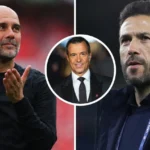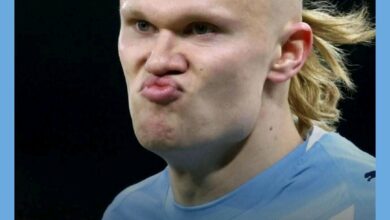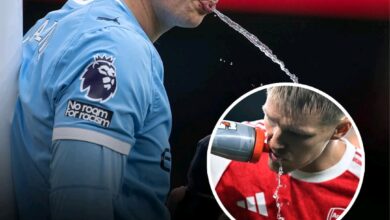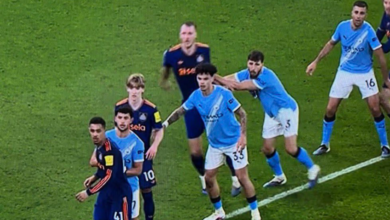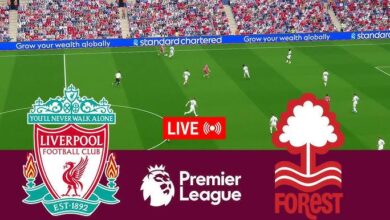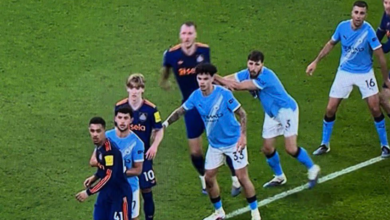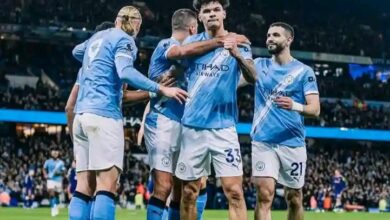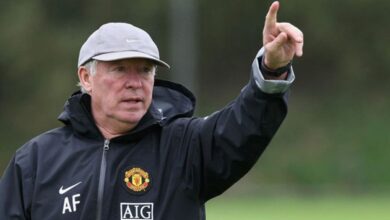Man City identify Man Utd target as Ederson replacement
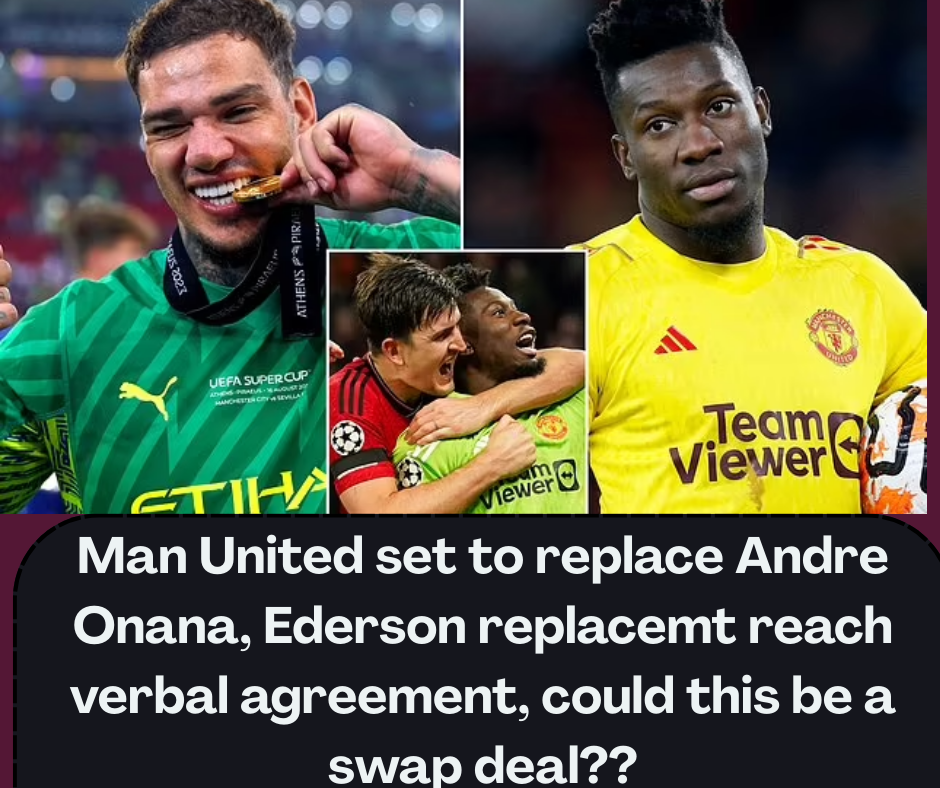
In a significant development that could reshape the goalkeeping landscape at the Etihad Stadium, Manchester City have reportedly identified FC Porto’s Diogo Costa as a prime candidate to replace Ederson, whose tenure as City’s first-choice goalkeeper appears to be drawing to a close. This revelation, reported by Sky Germany, sets the stage for what could become an intriguing transfer battle between the two Manchester giants, with United also expressing interest in the Portuguese international as questions persist about Andre Onana’s form.
The potential departure of Ederson would mark the end of a transformative era for Manchester City. Since joining from Benfica in 2017 for a then-record fee for a goalkeeper, the Brazilian has redefined the role of a modern goalkeeper with his exceptional ball-playing abilities, pinpoint distribution, and composed shot-stopping. His revolutionary style perfectly complemented Pep Guardiola’s possession-based philosophy, making him an integral component of City’s domestic dominance over the past seven years.
However, the 2024/25 season has witnessed a noticeable decline in Ederson’s performances. The 30-year-old has struggled with recurring fitness issues and inconsistent form, prompting Guardiola to periodically rotate him with his deputy. These circumstances, coupled with persistent interest from the Saudi Pro League, have created the conditions for what increasingly appears to be an inevitable summer departure.
According to the reports from Sky Germany, Ederson’s representatives have already initiated negotiations with potential suitors, with Saudi Arabia emerging as his “preferred destination.” The financial allure of the Saudi Pro League, which has successfully attracted numerous high-profile stars in recent years, presents an appealing option for Ederson as he contemplates the next phase of his illustrious career.
This isn’t the first time Ederson has been linked with a Saudi move. Similar rumors circulated last summer, though no transfer materialized. Guardiola addressed this speculation at the beginning of the current season, revealing: “He knew from day one that I didn’t want him to leave. The truth is the offer didn’t come. The real offer. They make an offer but the keeper, who won four Premier Leagues in a row, he has a value and a price. Otherwise, he cannot leave. If the offer did come, maybe he should not be here. This is the truth.”
The situation appears to have evolved significantly since then. Ederson’s continued struggles with fitness and form have potentially adjusted City’s valuation of their long-serving goalkeeper. The club seems increasingly open to sanctioning his departure provided a suitable offer arrives – an outcome that now appears more probable than it did twelve months ago.
This acceptance of Ederson’s potential exit has prompted Manchester City’s decision-makers to identify potential replacements, with Diogo Costa emerging as one of their “top candidates” according to the reports. The 25-year-old Portuguese international represents an intriguing option for City, possessing many of the attributes that would make him a natural successor to Ederson.
Costa has established himself as one of Europe’s most promising goalkeepers during his four seasons as Porto’s undisputed number one. A product of Porto’s academy, he made his first-team breakthrough in the 2021/22 season and hasn’t looked back since, accumulating significant experience both domestically and in Europe’s premier competitions. His performances for Portugal during the 2022 World Cup and subsequent international tournaments have further enhanced his reputation as an elite goalkeeper in the making.
The current season has been somewhat challenging for Porto collectively, with the club sitting outside the top three in Portugal’s Primeira Liga and out of title contention – an unusual position for one of the country’s traditional powerhouses. Despite this team underperformance, Costa has maintained his high standards, recording a league-leading 15 clean sheets. This ability to excel individually amid team struggles speaks volumes about his mental fortitude and consistent quality – attributes that would serve him well should he make the move to the high-pressure environment of the Premier League.
Costa’s appeal to Manchester City extends beyond his shot-stopping abilities. Like Ederson, he possesses exceptional distribution skills and confidence with the ball at his feet – prerequisites for any goalkeeper hoping to succeed in Guardiola’s system. His composure under pressure and ability to function effectively as an additional outfield player when needed makes him stylistically compatible with City’s established playing philosophy.
However, Manchester City aren’t the only Premier League giants monitoring Costa’s situation. Manchester United have reportedly identified the Portuguese goalkeeper as a potential solution to their own goalkeeping concerns. Andre Onana, who arrived at Old Trafford with significant expectations following his impressive stint at Inter Milan, has endured a difficult debut season in English football. While showing occasional glimpses of his quality, particularly in some Champions League performances, his overall inconsistency has raised doubts about his long-term suitability as United’s first-choice goalkeeper.
These concerns were amplified when manager Ruben Amorim decided to drop Onana following a particularly disappointing display against Lyon in the Europa League quarter-final first leg. This high-profile benching served to intensify speculation about United’s potential search for goalkeeping reinforcements in the upcoming summer window.
The emergence of both Manchester clubs as potential suitors for Costa creates the fascinating prospect of a transfer tug-of-war for the Portuguese goalkeeper’s signature. Such a scenario would add another dimension to the already intense rivalry between the neighboring clubs, extending their competition from the pitch to the transfer market.
For Costa himself, interest from both Manchester clubs represents a significant career crossroads. A move to either City or United would constitute a substantial step up from Porto, offering him the platform to establish himself as one of the Premier League’s elite goalkeepers while competing for major honors domestically and in Europe.
The City option would present the challenge of replacing a club legend in Ederson, whose unique skill set has been fundamental to their success under Guardiola. Stepping into such shoes would carry considerable pressure, but also the opportunity to work under one of football’s most innovative coaches in a system that traditionally empowers goalkeepers to showcase their complete range of abilities.
Conversely, United would potentially offer Costa a clearer path to immediate first-team football if their concerns about Onana persist. The prospect of becoming the latest in a distinguished lineage of United goalkeepers, following in the footsteps of Peter Schmeichel, Edwin van der Sar, and David de Gea, would undoubtedly appeal to any ambitious goalkeeper.
Several factors will ultimately determine Costa’s future. His contract situation at Porto will significantly influence any transfer negotiations. Financial considerations will also play a crucial role, with both Manchester clubs operating under different budgetary constraints and priorities. City’s potential income from Ederson’s sale could partially offset the substantial fee that Porto would likely demand for their prized asset, while United’s transfer approach will be guided by their broader squad rebuilding strategy under Amorim.
The preferences of the player himself cannot be discounted either. Costa may have his own vision regarding the next stage of his career, potentially influenced by playing style, competitive ambitions, and personal circumstances. The managerial stability at both clubs could also factor into his decision-making process, with City potentially entering a period of transition should Guardiola decide his extraordinary tenure has run its course.
For Manchester City, securing a goalkeeper of Costa’s caliber would represent a proactive approach to succession planning. The club has established a reputation for identifying and addressing potential squad deficiencies before they become problematic, and the goalkeeper position appears to be the latest area receiving this forward-thinking treatment.
Throughout Guardiola’s tenure, City have demonstrated remarkable continuity despite periodic player turnover. The potential transition from Ederson to Costa would align with this model – replacing a key player not when decline has become irreversible, but at the first significant signs that a change might soon be necessary. This methodology has served City well across other positions, contributing to their sustained domestic dominance.
The pursuit of Costa also reflects City’s broader transfer strategy of targeting players entering their prime years who possess both immediate quality and long-term potential. At 25, Costa offers the perfect balance between established capability and scope for further development, potentially giving City another decade of elite goalkeeping if secured.
For Manchester United, interest in Costa suggests an acknowledgment that their goalkeeping situation remains unresolved despite the significant investment in Onana. The Cameroonian’s mixed performances have created uncertainty in a position where United historically enjoyed remarkable stability during the De Gea era and before that with Van der Sar.
Amorim’s decision to bench Onana at a critical juncture of the season indicates that the club’s new management team harbors doubts about his reliability in high-pressure situations. While it’s premature to label Onana’s United career a failure, the exploration of alternatives like Costa suggests the club is at least preparing contingency plans should his form not improve consistently.
This goalkeeping situation epitomizes the broader challenges facing United as they continue their post-Ferguson rebuilding process. Despite substantial investment across multiple positions, the club continues to struggle with consistency issues that have prevented them from mounting sustained challenges for the Premier League title. Resolving the goalkeeping position would represent another piece of this complex puzzle.
The potential goalkeeping changes at both Manchester clubs illustrate the constant evolution required to maintain competitiveness at the elite level of European football. Even established stars like Ederson are not immune to the relentless demand for excellence, while promising talents like Costa must consistently prove themselves worthy of the biggest stages.
For Porto, the growing interest in their goalkeeper presents both a challenge and an opportunity. Losing a player of Costa’s quality would undoubtedly impact their sporting ambitions, but the substantial transfer fee his departure would command could facilitate a broader squad reinforcement if reinvested wisely. Portuguese clubs have long operated successfully with this model of developing talent and selling at a premium to Europe’s wealthier leagues.
As the summer transfer window approaches, the situations of all parties involved will become clearer. Ederson’s negotiations with potential Saudi suitors will either advance toward concrete offers or stall, directly influencing City’s urgency in pursuing Costa. Similarly, United’s evaluation of Onana over the remainder of the season will inform their transfer priorities.
The potential goalkeeper movement between these three clubs – City, United, and Porto – exemplifies the interconnected nature of the transfer market, where one transaction often triggers a sequence of related moves across different teams and leagues. This domino effect creates ripple impacts that extend far beyond the specific players directly involved.
From a technical perspective, Costa’s potential adaptation to the Premier League presents an intriguing storyline. The English top flight has traditionally presented unique challenges to goalkeepers arriving from other European leagues, with its physical intensity, aerial bombardment, and unpredictable weather conditions testing different aspects of a goalkeeper’s skill set compared to the Portuguese league.
However, Costa’s international experience with Portugal and Champions League appearances for Porto have already exposed him to various playing styles and high-pressure environments, potentially easing any transition to the Premier League. His commanding presence in the penalty area and comfort in possession suggest he possesses the foundational attributes necessary to succeed in English football.
The financial dimensions of this potential transfer are equally significant. Porto, like many Portuguese clubs, operate with a business model that necessarily incorporates player trading as a core revenue stream. Costa represents one of their most valuable assets, and any negotiations would reflect this reality. Reports suggest that his contract contains a release clause of approximately €75 million (£64 million), though whether either Manchester club would be willing to meet this figure remains uncertain.
City’s approach would likely depend on the fee received for Ederson, while United’s valuation would be influenced by their plans for Onana, who represented a significant investment just last summer. The economics of these interlinked transactions will play a crucial role in determining whether Costa indeed makes the move to Manchester, and if so, which side of the city becomes his home.
As this goalkeeping saga unfolds in the coming months, it serves as a reminder of the constant evolution required at football’s highest level. Even established stars like Ederson eventually face career crossroads, while emerging talents like Costa perpetually navigate the delicate balance between loyalty to their developmental clubs and the ambition to test themselves at the sport’s pinnacle.
For the fans of both Manchester clubs, the potential arrival of Costa would generate mixed emotions. City supporters would understandably feel nostalgic about Ederson’s likely departure after years of exceptional service, while simultaneously being excited about the prospect of a worthy successor. United fans, meanwhile, might view interest in Costa as either a necessary corrective to the Onana situation or a premature abandonment of a goalkeeper who deserves more time to establish himself.
The broader context of this potential transfer battle is the ongoing Manchester rivalry that has defined English football for much of the past decade. From competing for league titles to battling for transfer targets, City and United’s sporting conflict embodies the shifting power dynamics in English football. Once the undisputed kings of Manchester, United have watched their neighbors ascend to domestic dominance under Guardiola, creating an intensified determination to reclaim their former status.
Whichever club ultimately secures Costa’s signature – if indeed either does – the decision will reflect not just a sporting choice but a strategic one with long-term implications. In the modern game, where margins between success and failure are increasingly fine, getting such key personnel decisions right can have profound consequences for a club’s trajectory.
As the summer approaches, all eyes will be on this developing situation. Will Ederson indeed depart for Saudi Arabia after years of transformative service to Manchester City? Will Diogo Costa make the leap from Porto to the Premier League? And if so, will he don the sky blue of City or the red of United? These questions encapsulate the constant drama and uncertainty that make the transfer market such a compelling aspect of modern football.
For now, Costa continues to perform for Porto, doubtless aware of the growing interest in his services but maintaining professional focus on his current responsibilities. Meanwhile, both Manchester clubs continue their evaluations and strategic planning, preparing for what could become one of the summer’s most significant goalkeeping transfers. The chess game has begun, with the outcome potentially reshaping the goalkeeping landscape in Manchester for years to come.



